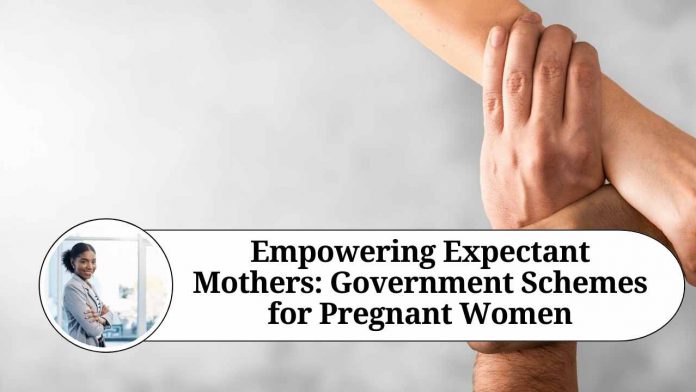Introduction:
Pregnancy is a transformative and crucial phase in a woman’s life. It brings joy, anticipation, and responsibility. Recognizing the significance of this period, governments around the world have implemented various schemes and programs to support and empower expectant mothers. These government initiatives aim to provide comprehensive healthcare, financial assistance, and social support to ensure the well-being of pregnant women and their unborn children. In this blog, we will explore some noteworthy government schemes designed specifically for pregnant women and their benefits.
- Maternity Benefit Program: One of the most common government schemes for pregnant women is the Maternity Benefit Program, which aims to provide financial assistance during pregnancy and childbirth. Under this program, eligible women receive monetary benefits to cover medical expenses, nutrition, and loss of wages during the period of pregnancy. It eases the financial burden associated with prenatal care and ensures that expectant mothers can access quality healthcare without worrying about expenses.
- Janani Suraksha Yojana (JSY): In India, the Janani Suraksha Yojana (JSY) is a prominent government scheme that aims to reduce maternal and infant mortality rates. It provides cash incentives to women living below the poverty line who deliver their babies in healthcare institutions. The program encourages institutional deliveries, ensuring access to skilled healthcare professionals and reducing the risks associated with home births. JSY also provides financial assistance for transportation to the healthcare facility and promotes awareness about safe motherhood practices.
- Special Supplemental Nutrition Program for Women, Infants, and Children (WIC): The Special Supplemental Nutrition Program for Women, Infants, and Children (WIC) in the United States is designed to support low-income pregnant women, new mothers, and young children. WIC provides nutritious food, counseling, and healthcare referrals to promote healthy pregnancies and positive birth outcomes. This program plays a crucial role in addressing nutritional deficiencies that can adversely affect both the mother and the developing fetus.
- Universal Maternity Benefit Scheme (UMBS): In Canada, the Universal Maternity Benefit Scheme (UMBS) ensures that all pregnant women have access to financial assistance during their pregnancy and after childbirth. The program offers a lump sum payment to eligible women, helping them cover expenses related to prenatal care, childbirth, and early parenting. UMBS provides much-needed financial support to expectant mothers, enabling them to focus on their health and well-being during this critical phase.
- Pregnancy Assistance Fund (PAF): In the United States, the Pregnancy Assistance Fund (PAF) supports pregnant and parenting teenagers and young women who may face challenges related to education, employment, and healthcare. PAF provides grants to states and tribal entities to establish and operate programs that offer a range of support services, including prenatal care, parenting education, counseling, and career development. This scheme empowers young mothers to pursue their educational and career goals while ensuring the well-being of their children.
Conclusion:
Government schemes for pregnant women play a vital role in promoting maternal and child health, reducing financial burdens, and providing social support during pregnancy and childbirth. These initiatives empower expectant mothers by ensuring access to quality healthcare, nutrition, and financial assistance. By implementing such programs, governments worldwide demonstrate their commitment to prioritizing the well-being of pregnant women and their unborn children. It is essential to continue advocating for and expanding these schemes to create a nurturing environment for all expectant mothers, regardless of their socioeconomic backgrounds.
Read more useful content:
Frequently Asked Questions (FAQs)
Q.What is a government scheme for pregnant women?
Government schemes for pregnant women are initiatives implemented by the government to provide support, healthcare, and financial assistance to expectant mothers during their pregnancy and childbirth.
Q.What kind of support do these schemes provide?
These schemes typically offer financial assistance to cover medical expenses, nutrition, loss of wages, and transportation costs. They may also provide access to quality healthcare services, counseling, and educational programs on prenatal care and parenting.
Q.Who is eligible for government schemes for pregnant women?
Eligibility criteria vary across different schemes and countries. Generally, these schemes target low-income pregnant women, those below the poverty line, and sometimes extend to teenagers and young mothers as well.
Q.How can pregnant women apply for these schemes?
The application process varies depending on the specific scheme and the country. In many cases, pregnant women can apply through designated government offices, healthcare facilities, or online portals. Local clinics, hospitals, or social welfare departments can provide further information on the application process.
Q.Are these schemes available worldwide?
Yes, various countries have implemented government schemes for pregnant women. The specific programs and benefits offered may differ, but the aim is universal—to provide support and care for expectant mothers.
Q.Are these schemes limited to medical expenses only?
No, these schemes often cover a wide range of expenses related to pregnancy and childbirth. Besides medical costs, they may include nutritional support, transportation assistance, maternity leave benefits, and even educational and career development programs.
Q.Can pregnant women benefit from more than one scheme simultaneously?
It depends on the country and the specific policies in place. In some cases, pregnant women may be eligible for multiple schemes, allowing them to access a broader range of benefits and support. However, it’s important to check the guidelines and regulations governing each scheme to ensure eligibility and avoid any conflicts.
Q.Can these schemes be availed by pregnant women in urban and rural areas alike?
Yes, government schemes for pregnant women are designed to cater to women in both urban and rural areas. Efforts are made to ensure equal access to healthcare, financial assistance, and support services, regardless of the geographic location.
Q.Are these schemes limited to first-time mothers only?
No, many government schemes for pregnant women are available to all expectant mothers, regardless of whether it is their first pregnancy or subsequent ones. The focus is on providing comprehensive support and care to all pregnant women in need.
Q.How can pregnant women learn about the available schemes in their country?
Pregnant women can gather information about government schemes for pregnant women through various channels. These include government websites, healthcare providers, local clinics, social welfare offices, community centers, and maternity hospitals. Additionally, reaching out to women’s support groups or speaking with healthcare professionals can provide valuable guidance on available schemes.




















